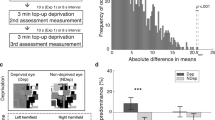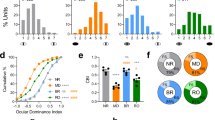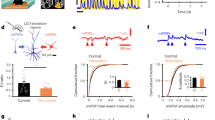Abstract
During a time of high vulnerability early in a kitten's postnatal life, a few days of monocular vision can result in the control of most striate cortical neurones exclusively by the open eye1–5. Although the general consequences of this procedure have been known for some time6, the mechanisms remain unknown. Because they develop rapidly3,4, it has been suggested that the processes involved are similar to those of memory and learning. One aspect of this analogy is that memory is thought to be ‘consolidated’ from a weak to a stable form and that the process can be disrupted by the administration of drugs, electroconvulsive shock or physical trauma7. The connection with plasticity in the visual cortex has been suggested by studies in which kittens were first bilaterally deprived and then briefly exposed either monocularly or binocularly3,4,8. The effects of exposure were reported to be greatest if there was a delay between exposure and Physiological study. Although this has been referred to as a ‘consolidation’ effect3,4,5,8, it was a delay process rather than a process of stabilisation that was investigated. Furthermore, even though the evidence for this effect is not compelling, it has been assumed that the consequences of monocular deprivation in kittens with prior normal rearing also are consolidated, that is, they become accentuated if the unilateral occlusion is followed by a period without vision5. We tested directly the notion that short-term monocular deprivation effects are more extensive if, after unilateral exposure, a period is imposed before Physiological study during which kittens are kept in darkness. We report here that the consolidation idea is not supported by our results. On the contrary, the post-monocular period spent in darkness actually diminished the consequences of the deprivation, allowing some functional recovery of binocular connections.
This is a preview of subscription content, access via your institution
Access options
Subscribe to this journal
Receive 51 print issues and online access
$199.00 per year
only $3.90 per issue
Buy this article
- Purchase on Springer Link
- Instant access to full article PDF
Prices may be subject to local taxes which are calculated during checkout
Similar content being viewed by others
References
Hubel, D. H. & Wiesel, T. N. J. Physiol. Lond. 206, 419–436 (1970).
Olson, C. R. & Freeman, R. D. J. NeuroPhysiol. 38, 26–32 (1975).
Pettigrew, J. D. & Garey, L. J. Brain Res. 66, 160–164 (1974).
Peck, C. K. & Blakemore, C. Expl Brain Res. 22, 57–68 (1975).
Movshon, J. A. & Dursteler, M. R. J. Neurophysiol. 40, 1255–1265 (1977).
Wiesel, T. N. & Hubel, D. H. J. Neurophysiol. 26, 1003–1017 (1963).
Agranoff, B. W., Burrell, H. R., Dokas, L. A. & Springer, A. D. in Psychopharmacology: A Generation of Progress (eds Lipton, M. A., Di Marco, A. & Killam, K. F.) 623–635 (Raven, New York, 1978).
Buisseret, P., Gary-Bobo, E. & Imbert, M. Nature 272, 816–817 (1978).
Hubel, D. H. & Wiesel, T. N. J. Physiol., Lond. 160, 106–154 (1962).
Freeman, R. D. Expl Brain Res. 33, 51–63 (1978).
Schechter, P. B. & Murphy, E. H. Brain Res. 109, 165–168 (1976).
Kesner, R. P. & Wilburn, M. W. Behav. Biol. 10, 259–293 (1974).
Gold, P. E., Zornetzer, S. F. & McGaugh, J. L. Adv. Psychobiol. 2, 193–224 (1974).
Author information
Authors and Affiliations
Additional information
address for reprints: Physiological Laboratory, Downing Street, Cambridge, UK.
Rights and permissions
About this article
Cite this article
Freeman, R., Olson, C. Is there a ‘consolidation’ effect for monocular deprivation?. Nature 282, 404–406 (1979). https://doi.org/10.1038/282404a0
Received:
Accepted:
Issue Date:
DOI: https://doi.org/10.1038/282404a0
This article is cited by
Comments
By submitting a comment you agree to abide by our Terms and Community Guidelines. If you find something abusive or that does not comply with our terms or guidelines please flag it as inappropriate.



